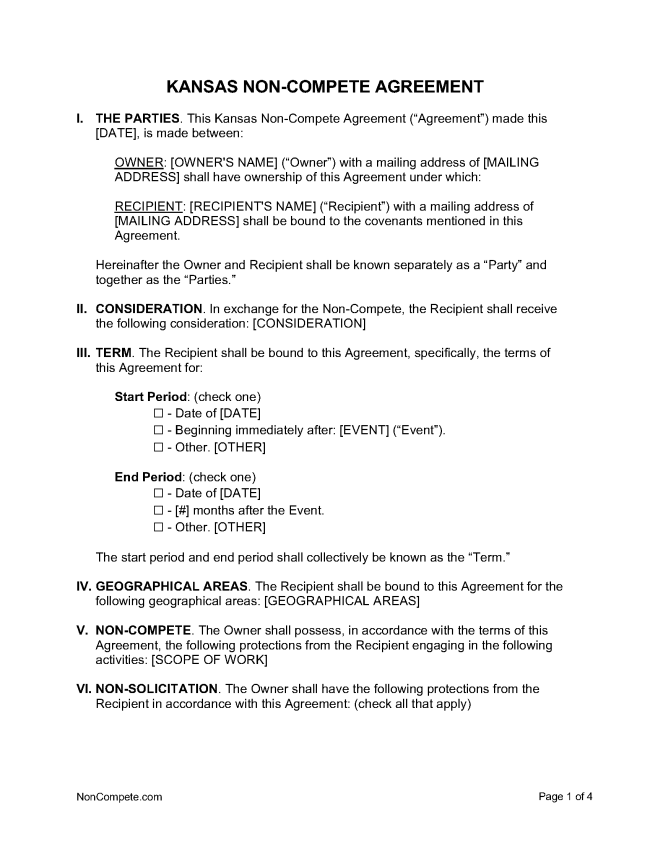A Kansas non-compete agreement is a part of a contract for employment or for the sale of a business that limits the work a former employee can do after leaving a firm. Non-competes are often called covenants not to compete, and they are likely easier to enforce than in other states.
In most states, the party seeking to enforce a non-compete agreement must show evidence that the court should enforce it. In Kansas, non-competes, like other contracts, are automatically presumed to be valid.
Table of Contents |
Are Non-Competes Enforceable in Kansas?
Yes, so long as they are reasonable and part of a valid contract. Courts determine the reasonability of a non-compete agreement by examining four factors:
- Does the agreement protect the legitimate business interest of the employer?
- Does the agreement create an undue burden on the employee?
- Does the agreement harm the public welfare?
- Are the agreement’s duration and regional limits reasonable?
Employment Contract vs. Sale of Business
Non-compete agreements must be part of a valid contract to be enforceable, but that contract may be one for selling a business or an employment agreement. Courts evaluate non-compete agreements found in an employment contract more strictly than those in a contract for the sale of a business. (H & R Block, Inc. v. Lovelace (1972))
Legitimate Business Interest
Potential legitimate business interests include:
- Customer contacts
- Special training of employees
- Trade secrets
- Confidential business information
- Averting loss of clients or assuring that clients renew their contracts
- The good will and reputation of a business
- Sources of referrals for new business
Idbeis v. Wichita Surgical Specialists, P.A. (2005)
Undue Burden
A non-compete agreement that totally restricts an employee from working in a particular field is less likely to be enforced. Courts are more likely to enforce an agreement that allows the employee to work in the field if the employee pays a set fee to the former employer, which is called “liquidated damages.” (Wichita Clinic, P.A. v. Louis (2008)).
Public Welfare
Courts are less likely to enforce a non-compete agreement that, if enforced, would leave an area with a shortage of an essential public good. For example, in Graham v. Cirocco (2003), enforcing the non-compete agreement would have left 700,000 people in Northeastern Kansas with only one colorectal surgeon. The court declined to enforce it because having an additional surgeon would be better, even if two weren’t optimal.
Prohibited Professions
Attorneys cannot enter contracts for partnership or employment that restrict their right to practice, except for limited restrictions in contracts concerning retirement benefits. Rule 240.5.6(a), Kansas Court Rules.
Attorneys also cannot enter case settlement agreements that restrict their right to practice in the future. Rule 240.5.6(b), Kansas Court Rules.
Terminating an Employee
Kansas courts haven’t determined whether terminating an employee makes a non-compete agreement unenforceable.
Burden of Proof
A party challenging a contract has the burden of proving that it is illegal. (Wichita Clinic, P.A. v. Louis (2008))
Continued Employment (consideration)
It is unclear whether continued employment is adequate consideration to support a non-compete agreement. In Puritan-Bennet Corp. v. Richter (1983), the Court of Appeals held that it could be. In that case, a non-compete agreement in which a former employee who had received a promotion and increased responsibilities after signing the agreement was deemed enforceable.
Maximum Term
There is no maximum term for a non-compete agreement, and the total amount of time one can be enforced may depend on the area covered.
- Agreements lasting two years are typically enforced. Graham v. Cirocco (2003)
- In Foltz v. Struxness (1950), a non-compete agreement of 10 years covering territory within a radius of 100 miles was unreasonable. Still, a non-compete lasting ten (10) years and covering a radius of five miles was reasonable.
Blue Penciling (allowed)
When a portion of a non-compete agreement is unreasonable, then the term can be modified to be reasonable so that the agreement can be enforced. (Eastern Distributing Co., Inc. v. Flynn (1977))
